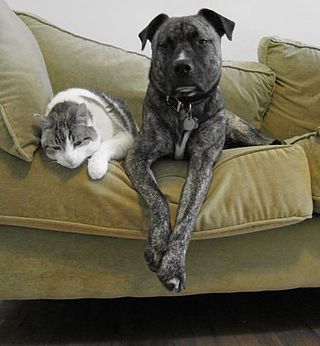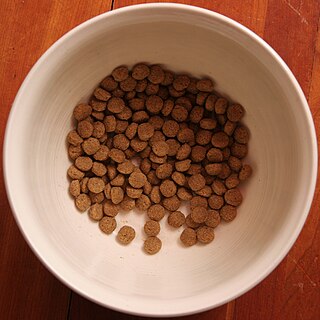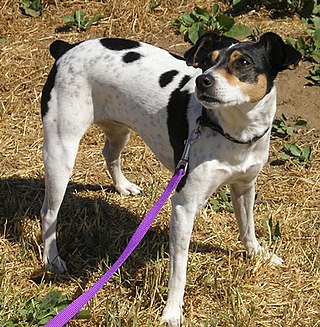Related Research Articles

A pet, or companion animal, is an animal kept primarily for a person's company or entertainment rather than as a working animal, livestock, or a laboratory animal. Popular pets are often considered to have attractive/cute appearances, intelligence, and relatable personalities, but some pets may be taken in on an altruistic basis and accepted by the owner regardless of these characteristics.

Dog food is specifically formulated and intended for consumption by dogs and other related canines. Dogs are considered to be omnivores with a carnivorous bias. They have the sharp, pointed teeth and shorter gastrointestinal tracts of carnivores, better suited for the consumption of meat than of vegetable substances, yet also have ten genes that are responsible for starch and glucose digestion, as well as the ability to produce amylase, an enzyme that functions to break down carbohydrates into simple sugars – something that obligate carnivores like cats lack. Dogs evolved the ability living alongside humans in agricultural societies, as they managed on scrap leftovers and excrement from humans.

CC, for "CopyCat" or "Carbon Copy", was a brown tabby and white domestic shorthair and the first cloned pet. She was cloned by scientists at Texas A&M University in conjunction with Genetic Savings & Clone Inc. CC's surrogate mother was a tabby, but her genetic donor, Rainbow, was a calico domestic longhair. The difference in hair coloration between CC and Rainbow is due to X-inactivation and epigenetic re-programming, which normally occurs in a fertilized embryo before implantation.

Iams is an American brand of dog food and cat food manufactured by Spectrum Brands in Europe and Mars, Incorporated in specific countries and Procter & Gamble worldwide. The food is formulated for the puppy/kitten, adult and mature stages of life. Veterinary formulas for pets with special dietary requirements are also produced.
Animal euthanasia is the act of killing an animal humanely, most commonly with injectable drugs. Reasons for euthanasia include incurable conditions or diseases, lack of resources to continue supporting the animal, or laboratory test procedures. Euthanasia methods are designed to cause minimal pain and distress. Euthanasia is distinct from animal slaughter and pest control.

The Rat Terrier is an American dog breed with a background as a farm dog and hunting companion. They share much ancestry with the small hunting dogs known as feists. Common throughout family farms in the 1920s and 1930s, they are now recognized by the United (UKC) and American Kennel Clubs (AKC) and are considered a rare breed. Rat Terriers are an intelligent and active breed that can be kept both for pest control and as a family pet.

Nestlé Purina PetCare, or simply Purina, is an American subsidiary of the Swiss corporation Nestlé, based in St. Louis, Missouri. It produces and markets pet food, treats, and cat and dog litter. Some of its pet food brands include Purina Pro Plan, Purina Dog Chow, Friskies, Beneful and Purina One. The company was formed in 2001 by combining Nestlé's Friskies PetCare Company with Ralston Purina, which acquired it for $10.3 billion. As of 2012, it is the second-largest pet food company globally and the largest in the United States.
Little Nicky is the first commercially produced clone of a cat. He was produced from the DNA of a 17-year-old Maine Coon cat named Nicky who died in 2003. Little Nicky's owner, a north Texas woman named Julie paid $50,000 to have Nicky cloned. Little Nicky's owner reported that the cat shared many characteristics with his predecessor, including a similar personality and appearance.
Commercial animal cloning is the cloning of animals for commercial purposes, including animal husbandry, medical research, competition camels and horses, pet cloning, and restoring populations of endangered and extinct animals. The practice was first demonstrated in 1996 with Dolly the sheep.
Snuppy was an Afghan hound, the first dog clone. The puppy was created using a cell from an ear from an adult Afghan hound and involved 123 surrogate mothers, of which only two produced pups. The Department of Theriogenology and Biotechnology at Seoul National University, which cloned Snuppy, was led by Woo Suk Hwang. Snuppy has since been used in the first known successful breeding between cloned canines after his sperm was used to artificially inseminate two cloned females, which resulted in the birth of 10 puppies in 2008. In 2017, 4 clones of Snuppy were made by Sooam, and were the first clones made of a cloned dog, to investigate potential health effects of cloning.

PetSmart Inc. is a privately held American chain of pet superstores, which sell pet products, services, and small pets. It is the leading North American pet company, and its direct competitor is Petco. Its indirect competitors are Amazon, Walmart, and Target. As of 2020, PetSmart has more than 1,650 stores in the United States and Canada. Its stores sell pet food, pet supplies, pet accessories, and small pets. Stores also provide services including grooming, dog daycare, dog and cat boarding, veterinary care via in-store third-party clinics, and dog training. They also offer dog and cat adoption via in-store adoption centers facilitated by the non-profit PetSmart Charities.

A pet door or pet flap is a small opening to allow pets to enter and exit a building on their own without needing a human to open the door. Originally simple holes, the modern form is a hinged and often spring-loaded panel or flexible flap, and some are electronically controlled. They offer a degree of protection against wind, rain, and larger-bodied intruders entering the dwelling. Similar hatches can let dogs through fences at stiles. A related concept is the pet gate, which is easy for humans to open but acts as a secure pet barrier.

Petco Health and Wellness Company, Inc. is an American pet retailer with corporate offices in San Diego and San Antonio. Petco sells pet food, products, and services, as well as certain types of live small animals.
The Missyplicity Project was a project devoted to cloning Joan Hawthorne and John Sperling's dog, a border collie and husky mix. Missy died on July 6, 2002, at the age of 15.
Beginning in March 2007, there was a widespread recall of many brands of cat and dog foods due to contamination with melamine and cyanuric acid. The recalls in North America, Europe, and South Africa came in response to reports of kidney failure in pets. Initially, the recalls were associated with the consumption of mostly wet pet foods made with wheat gluten from a single Chinese company.
"The Dog Said Bow-Wow" is a science fiction short story by American writer Michael Swanwick, published in 2001. It won the 2002 Hugo Award for Best Short Story and was nominated for the 2002 Nebula Award for Best Short Story. The Dog Said Bow-Wow is the title story of his 2007 short story collection, published by Tachyon Publications, and was reprinted in the same year in Rewired: The Post-Cyberpunk Anthology.
Foster & Smith, Inc. was an American mail order and e-commerce pet supply corporation based in Rhinelander, Wisconsin. The company funds PetEducation.com, a "resource for any pet owner who is seeking information."

Human interaction with cats relates to the hundreds of millions of cats that are kept as pets around the world. The inter-relationship involves companionship, communication and caregiving. Dating back thousands of years, cats were originally domesticated for their ability to control pests and later became valued companions. Cats communicate through vocalizations, body language and behaviors, forming strong bonds with their human owners. Owners provide the food, shelter, and medical care, while play and enrichment activities stimulate their physical and mental well-being. Despite their independent nature, cats enjoy human company and require understanding of their unique behaviours. Positive reinforcement training can shape desired behaviours, fostering a harmonious relationship between humans and their feline companions, built on mutual respect and affection.
Pegs'n Co was a French software company that developed a traditional animation software package called Pegs, and is now part of Canadian company Toon Boom Animation. It was based in Paris, France. Pegs was used for several animated feature films, shorts, and television series, and it powered the French animation industry until the 2000s as it was used by studios like Millimages, Alphanim, and Animage, but it was also used by studios in other countries, most notably Saerom Animation, CineGroupe, and Mike Young Productions. In total, Pegs was used by over 100 studios worldwide.
References
- ↑ "Dead Cats to Remain a Memory" WIRED Magazine. Archived 31 July 2014
- ↑ "blog.bioethics.net". Archived from the original on 2007-10-12. Retrieved 2007-08-22.